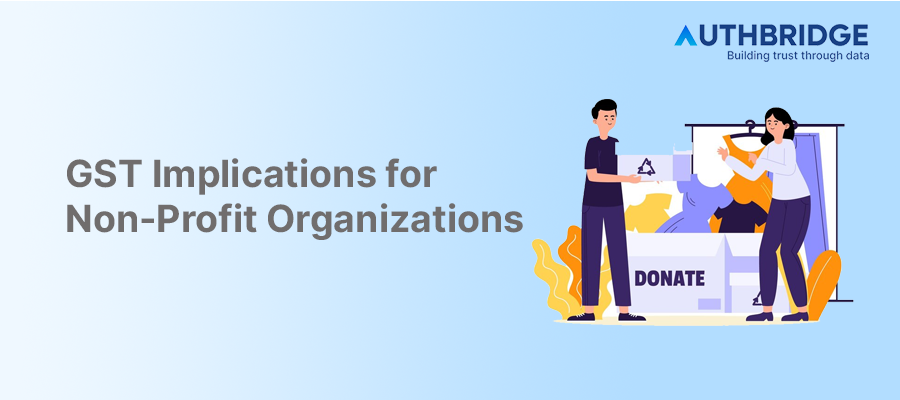Understanding GST Implications For Non-Profit Organizations: A Comprehensive Overview

GST Overview for Non-Profit Organizations
The Goods and Services Tax (GST) in India applies to all entities involved in buying or selling goods or providing services, including non-profit organizations (NPOs) such as NGOs, charitable trusts, and religious trusts. This section provides an overview of how GST impacts these organizations, highlighting the need for understanding GST obligations to ensure compliance and optimize tax benefits.
Definition of NGO, Charitable, and Religious Trusts
- NGO (Non-Governmental Organization): A not-for-profit entity aimed at promoting social welfare or environmental concerns, independent of government influence.
- Charitable Trusts: Trusts established with the primary goal of providing charitable services to the public, including education, healthcare, and social welfare.
- Religious Trusts: Trusts set up for religious purposes, focusing on activities related to the practice and promotion of religious beliefs.
Applicability of GST on Non-Profit Organizations
Threshold for GST Registration
Non-profit organizations are required to register for GST if their annual turnover exceeds Rs. 20 lakh (Rs. 10 lakh for North-Eastern and hill states). This threshold is critical for NPOs to determine their GST registration obligations.
Organization Type | Turnover Threshold |
General | Rs. 20 lakh |
NE and Hill States | Rs. 10 lakh |
Exemptions for Certain Activities
Certain activities conducted by NGOs, charitable, and religious trusts may be exempt from GST, particularly those related to the advancement of religion, spirituality, or yoga, and services aimed at providing education, healthcare, or social welfare.
Activity Type | GST Exemption Status |
Religious Activities | Exempt |
Charitable Services | Exempt |
GST Registration Process
Steps for Registering under GST
The GST registration process for non-profit organizations involves visiting the GST portal, completing the online registration form, and submitting the necessary documents. This process aligns with that of commercial entities but tailored to the specifics of non-profit operations.
Documentation Required
Required documents typically include proof of constitution (like trust deed), PAN of the organization, bank account details, and authorization form for the signatory.
Document Type | Description |
Proof of Constitution | Trust deed, etc. |
PAN Card | PAN of the organization |
Bank Details | Bank account proof |
GST Rates for Non-Profit Organizations
General GST Rates Applicable
Non-profit organizations are subject to the same GST rates as commercial entities for the goods and services they provide unless specific exemptions apply. The standard GST rates range from 5% to 28%, depending on the nature of the goods or services.
Goods/Services | GST Rate |
Standard Goods | 5% to 28% |
Standard Services | 5% to 18% |
Specific Exemptions and Concessions
Certain goods and services provided by non-profit organizations may qualify for GST exemptions or concessions, particularly those directly related to charitable activities or services deemed essential for public welfare.
Service Category | GST Exemption |
Educational Services | Exempt |
Healthcare Services | Exempt |
Input Tax Credit for Non-Profit Organizations
Eligibility for Claiming ITC
Non-profit organizations registered under GST can claim Input Tax Credit (ITC) for the GST paid on inputs used in the course or furtherance of their business activities. This is contingent on these inputs being used for making taxable supplies, including zero-rated supplies.
Input Type | Eligibility for ITC |
Goods for business use | Eligible |
Services for business use | Eligible |
Restrictions on Input Tax Credit
There are restrictions on claiming ITC for certain goods and services, especially those used for personal consumption or exempt supplies. Non-profits must maintain clear records to distinguish between inputs used for taxable and non-taxable activities.
Input Type | Restriction on ITC |
Personal use items | Not Eligible |
Inputs for exempt supplies | Not Eligible |
Compliance and Reporting under GST
Filing GST Returns
Non-profit organizations must file periodic GST returns, similar to commercial businesses. This includes monthly, quarterly, and annual returns, depending on their turnover and the nature of their activities.
Return Type | Frequency |
GSTR-1 (Outward supplies) | Monthly/Quarterly |
GSTR-3B (Summary return) | Monthly |
Record-Keeping Requirements
Maintaining accurate records is crucial for non-profit organizations to comply with GST regulations. This includes documentation of all taxable supplies made and received, ITC claimed, and GST paid on supplies.
Record Type | Requirement |
Invoices issued | Keep for 6 years |
ITC documents | Keep for 6 years |
Conclusion
The GST regime brings non-profit organizations under its ambit, requiring compliance with registration, rate application, ITC eligibility, and filing returns. While certain exemptions apply, especially for charitable activities, understanding and adhering to GST regulations is crucial for maintaining compliance and optimizing tax benefits.
Importance of Compliance for Non-Profit Organizations
Compliance with GST laws ensures that non-profit organizations can continue their activities without legal hindrances, leveraging tax credits and exemptions where applicable. It underscores the importance of accurate record-keeping and understanding the GST implications for their operations.
Category

Abhinandan Banerjee
(Associate Manager - Marketing)
Abhinandan is a dynamic Product and Content Marketer, boasting over seven years of experience in crafting impactful marketing strategies across diverse environments. Known for his strategic insights, he propels digital growth and boosts brand visibility by transforming complex ideas into compelling content that inspires action.



